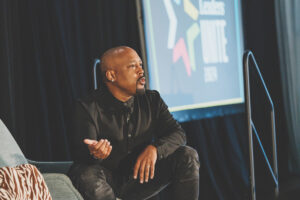Why I Began as a Self-Funded Entrepreneur
When the startup and investment arenas struggle to embrace ideas from different perspectives, here’s how to persist. Venture capital can be the lifeblood of entrepreneurial endeavors and the catalyst for entrepreneurial growth. However, its support is often elusive. To protect their investments, venture capitalists rely on certain patterns and trends to help them separate surefire…
Read Time
8 min read
Posted on
April 14, 2025

When the startup and investment arenas struggle to embrace ideas from different perspectives, here’s how to persist.
Venture capital can be the lifeblood of entrepreneurial endeavors and the catalyst for entrepreneurial growth. However, its support is often elusive.
To protect their investments, venture capitalists rely on certain patterns and trends to help them separate surefire opportunities from the overly risky. They diligently observe things like technological advancements and consumer trends to pinpoint startups with solutions that aim to address unmet needs or significant inefficiencies. They also scrutinize a startup’s team and evaluate their expertise and resilience. A blend of market foresight, thorough analysis, and a focus on scalability help VCs navigate markets with lucrative investments.
However, the corridors of the VC industry predominantly echo the voices and visions of conventional entrepreneurs. Some of the top investment areas in 2023 have been gaming and media. VC firms are in contract with limited partners and general partners who set the investment criteria. Then the start-up must fit the boxes prescribed. The flaw in this is that disruption is outside of the box, landing those ideas often in the trash pile. I believe the models they follow tend to go in the opposite way of true disruption. This isn’t to say that unicorns don’t emerge and become household names, but it’s not as frequent as it perhaps could be.
Entrepreneurs might be surprised to learn this, but vocalizing a disruptive vision can sometimes result in receiving less funding — and sometimes no funding at all. Funding earmarked for groundbreaking ideas often ends up supporting ventures that adhere to more established norms, which can sideline pioneering entrepreneurs who aim to revolutionize industries. It’s understandable, as 90 percent of disruptive startups typically fail within their first year, according to a 2020 report by Startup Genome. Beyond that, venture capitalists often fail to analyze disruptive ideas without predisposition or bias, unsure of how to fund the truly disruptive.
This is the exact struggle Salesforce founder Marc Benioff had, and it’s something I also experienced when trying to secure funding for my company. I don’t expect VCs to be able to predict the future, and I do believe that disruptive companies are rare because, well, that’s what makes them disruptive. However, continuing to exclude disruption from the entrepreneurial narrative perpetuates a cycle of inequity within the ecosystem. It’s for these reasons that I became a self-funded entrepreneur.
Where Is Our Disruptive Entrepreneurial Ecosystem?
The absence of a disruptive ecosystem can further impede the growth and representation of diverse leadership. The startup and investment arenas struggle to embrace and nurture the wealth of ideas that emerge from different perspectives. Unconventional founders often find themselves navigating an uphill battle as venture capital tends to favor tried-and-tested businesses. Women-led businesses are 63 percent less likely to secure funding than those founded by men, according to 2020 INSEAD data, and while funding for Black-owned startups has increased, Black women only received 0.34 percent of total venture capital spending in 2021, Crunchbase reported.
Armed with advanced degrees and a family legacy of scientists and mathematicians, I encountered relentless challenges when starting my company in the emerging green tech space. If I had been building a company in the gaming industry, for example, or was seeking funding for a simple software platform or beauty product, I’m confident I would have received more immediate financial support. But if you don’t fit into the current VC-prescribed investment thesis, you don’t get funded.
Just like Salesforce is now a billion-dollar giant, I’ve grown my platform-as-a-service business for co-manufacturing into a successful organization helping to cultivate higher-wage jobs in marginalized communities while providing services and co-working space to green startups in predominantly Black areas. I wanted to make Miami more inclusive to bridge the gap between innovation and equitable opportunities, and that mission will carry to other cities and counties as we grow.
I realize some of my previous insights might sound a bit bleak, but I want to express my hope and excitement for the future of innovation. I believe entrepreneurs are finding creative ways to push inventions forward without initial VC investment, which leads to more ownership for founders as they grow.
To Evolve, Keep Your Voice and Vision
My career has been fraught with encounters that typify the challenges faced by disruptive entrepreneurs. Financial and real estate professionals did not understand my vision or industry at first, and that’s OK. Green tech isn’t an industry that most professionals are familiar with — although that is changing. However, when I built the first container homes in Miami Gardens and the first of its kind in affordable housing, the industry began to explode, and lots of funding followed for many developers.
When you rely on funding from others, it can often weaken your voice and vision, keeping your business from evolving. It’s important for any founder to maintain conviction in their vision. This is a testament to your resilience and belief in the transformative impact of your ideas. Surrounding yourself with a supportive community that believes in the power of diversity and unique perspectives is pivotal. Seek out mentors, peers, and allies who champion inclusivity so you can forge ahead with confidence and determination. Remember, the world needs a distinct lens through which you view challenges and opportunities.
Develop and Maintain Your Entrepreneurial Agency
Mastering your entrepreneurial destiny through self-funding isn’t merely a financial decision — it’s a statement of autonomy and empowerment. You steer the course of your venture, which can instill a profound sense of ownership. I believe you must prepare with humility but perform with confidence, and once you prove success, you will be surprised how investors begin to throw capital your way.
Self-funding also equips you with a comprehensive understanding of your venture’s financial intricacies. It’s an immersive experience that goes beyond monetary aspects, teaching valuable lessons in resourcefulness, strategic planning, and fiscal responsibility. Every dollar invested becomes a deliberate choice, fostering a lean and efficient operation. This hands-on approach to financial management cultivates a depth of knowledge that extends far beyond the immediate needs of your business, providing a solid foundation for sustainable growth and resilience in the face of challenges.
I quickly realized my destiny was in my hands, which empowered a self-confidence and resilience I might have otherwise neglected partnering with other VC investors. For innovative entrepreneurs, this realization serves as a catalyst to challenge norms, shatter barriers, and carve new paths forward.
Explore and Nurture Your Core Entrepreneurial Skills
Self-funding is an immersive learning experience that hones a spectrum of core entrepreneurial skills. It forces entrepreneurs to develop skills beyond the conventional realms of business. From resourcefulness and adaptability to resilience and innovation, self-funding cultivates a versatile skill set crucial for your success. The need to manage limited resources efficiently prompts creative problem-solving, pushing you to explore innovative solutions and unconventional pathways to growth.
An entrepreneur’s most important tool is discipline. You must discern to use the resources you have wisely because your discipline and allocation of resources will make all the difference to your success. As a diverse founder, I’ve found that people will waste as much of your time as you let them. I have learned the hard way to be careful of the tyranny of the urgent. Learn to say no, and set agendas for your day, week, month, and year.
Navigating the self-funding landscape nurtures an inherent understanding of risk management and strategic decision-making. Every choice carries weight, compelling a meticulous evaluation of opportunities and potential risks. This hands-on approach to risk assessment and mitigation becomes ingrained in your entrepreneurial toolkit, empowering you to make informed decisions while remaining agile in a dynamic market. Moreover, the ability to pivot and adapt strategies in response to challenges becomes second nature, ensuring your venture remains agile and resilient in the face of ever-evolving circumstances.
The time is ripe for a seismic shift toward a more disruptive entrepreneurial ecosystem. The call to action rests not just with entrepreneurs themselves but within the broader ecosystem. It demands a concerted effort to recalibrate the narrative, foster networks that champion new ideas, and institute structures that offer opportunities for all voices. Choosing the path of self-funding isn’t without its trials, yet it embodies a powerful assertion of control and purpose. This journey doesn’t just benefit individual entrepreneurs; it enriches the entrepreneurial landscape.
Self-funding will phase out when you develop a track record of success. You will be amazed how funders compete with each other for your business, so be patient and keep turning a profit. This is where the skills of negotiation and prudence really come in handy, as you now know your value and can negotiate fair terms.
Overview
When the startup and investment arenas struggle to embrace ideas from different perspectives, here’s how to persist. Venture capital can be the lifeblood of entrepreneurial endeavors and the catalyst for entrepreneurial growth. However, its support is often elusive. To protect their investments, venture capitalists rely on certain patterns and trends to help them separate surefire…







